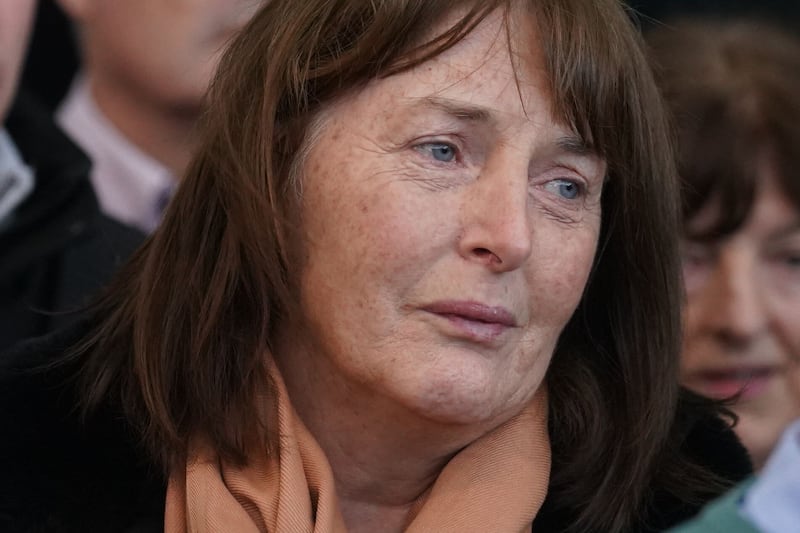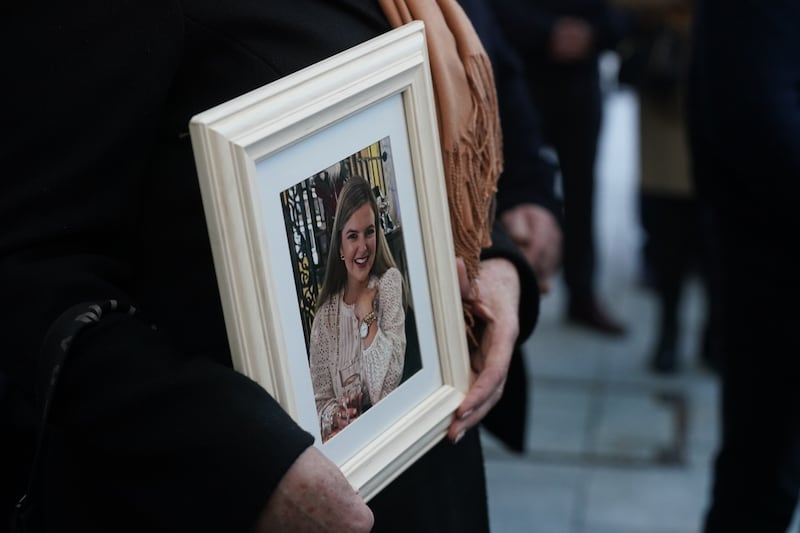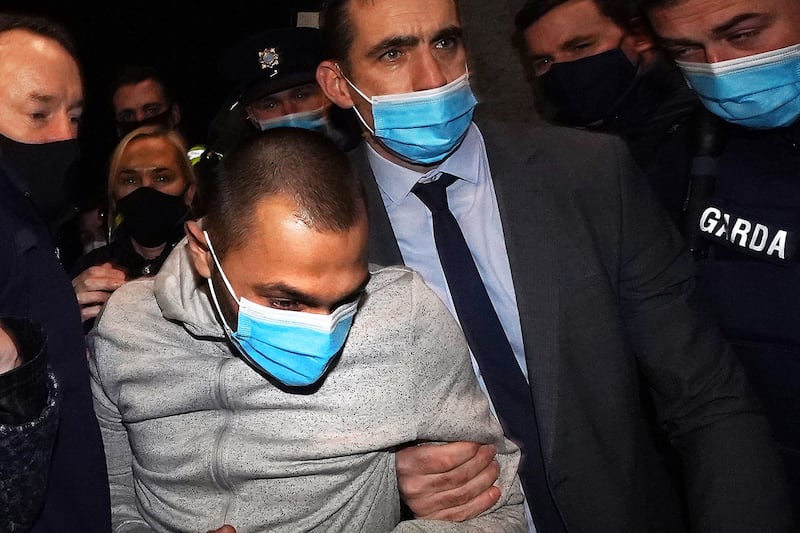A member of An Garda Siochána has told a court that the man accused of killing Ashling Murphy admitted murdering her.
The Central Criminal Court in Dublin heard that Josef Puska made the admission through an interpreter while under questioning in hospital.
Ms Murphy, 23, was killed while out exercising on a canal path in Tullamore, Co Offaly, at about 3.30pm on January 12 last year.
Puska, 33, of Lynally Grove in Mucklagh, Tullamore, has pleaded not guilty to the schoolteacher’s murder.

Detective Garda Brian Jennings told the court he had questioned Puska at St James’s Hospital in Dublin with the assistance of an interpreter on January 13.
Top stories
- Martin McConnell: 'When I came out of hospital, the whole thing was over. The All-Ireland had been won'
- Dark Hedges a 'death trap' as trees deemed risk to public
Mr Jennings said Puska made the admission after he had been informed he was a “person of interest” in the murder of Ms Murphy.
Relaying the translation of the interpreter, the garda said: “He paused and said he is making an official statement that he is admitting that he committed the murder. ‘I did it. I murdered. I am the murderer’.”
Mr Jennings said he had been at St James’s Hospital to execute a warrant to seize items belonging to Puska.
Gardai had been informed that Puska was in the hospital by investigators examining a separate stabbing in the Blanchardstown area of Dublin.
Garda Conor Newman told the court he had been tasked with speaking to someone who had arrived at hospital with stab wounds on January 13 and may have been a third victim of a stabbing in Blanchardstown the day before.
He said he and another garda had identified themselves as gardai to Puska and called a translator.
Garda Newman said Puska claimed he had got a lift from Offaly to Heuston station where he hailed a taxi to meet a woman in the Blanchardstown area.
He said Puska alleged he was immediately attacked by two males after leaving the taxi.
The garda said Puska gave a “vague description” of the location and said he “maybe” lost a phone during the alleged attack.
Garda Newman said Puska had “clear scratches on his hands”, adding: “To me it looked like briar marks.”
He said Puska also had scratches on his forehead.
Garda Newman said the questioning was halted after Puska appeared to “wince in pain” and a heart monitor alarm activated.
“We weren’t satisfied with the answers he had given us because it did not really give us a clear line of inquiry to follow up on.
“We knew there was more to the story, that there was holes in the story.”
He later gave details of the conversation to his supervisor, Detective Inspector Shane McCartan.

Mr McCartan told the court it became apparent that Puska’s injuries, nationality and answers may be of “material assistance” to the Tullamore murder investigation.
“Upon evaluation, it was apparent there was a dearth of cogent information we were capable of developing.”
Mr McCartan said he discussed Puska’s injuries and lack of detail on his journeys to Dublin and Blanchardstown.
He added there were “a lot of pieces of a jigsaw puzzle that just couldn’t be put together”, saying: “It just didn’t add up.”
Mr McCartan said he had viewed a photograph of Puska’s hand and face injuries to determine if they were caused by a knife.
“It was quite apparent from the photographs it wasn’t. It was sharp foliage, a sharp bush or thorns.”
Mr Jennings, from Birr Garda Station, said he was tasked with travelling to St James’s Hospital on January 13 to get an account of Puska’s movements the day before.
He met the gardai from Blanchardstown who had spoken to Puska over the separate stabbing.

Mr Jennings said he was unable to speak to Puska on January 13 because he was either in theatre or a recovery ward.
He returned the next day and spoke to the accused, initially in English.
“He was awake, he was sitting up, he was alert.”
Mr Jennings said Puska gave him his address and said he had been stabbed three times in his abdomen.
He said the accused appeared to be in pain and was dry retching.
The garda called an interpreter to continue questioning and Puska was moved to a staff office for privacy.
Mr Jennings asked him how he got to Dublin and Puska said a friend had driven him from Birr.
The garda told the court that Puska said he had not shaved recently and did not have a beard, and he added that he had disposed of his clothes.

Mr Jennings said the accused was alert and fully awake: “He was freely speaking. The interpreter remembers struggling to keep up with him.”
He said Puska claimed he had been stabbed by a man and he may have lost consciousness.
The garda said that when he was asked about the scratches, the accused claimed he was trying to defend himself and dragged himself on the ground.
He told the court Puska had said his bicycle had been taken from outside his home.
Mr Jennings said this line of questioning ended after 40 minutes but he returned for further questioning after Sergeant Pamela Nugent obtained a warrant to seize Puska’s belongings in relation to the murder investigation.
He said Puska, who had been taken to a private room, was alert and fully awake and had remembered speaking to him earlier in the day.
The garda said they explained the warrant to him through an interpreter over the phone.
Mr Jennings said Puska asked if he was a suspect, adding: “I said no, he was a person of interest.”
The garda said there was a “notable pause” before the interpreter relayed that Puska was admitting he committed the murder.
Mr Jennings said he immediately cautioned the accused and the interpreter said Puska understood that.
He told the court: “I asked him a direct question, did he commit the murder, and he said ‘Yes’.”
Mr Jennings relayed the words of the interpreter from his notes: “The reason I am pleading guilty, I don’t want my family, anything to happen to them, nothing bad to them. I feel guilty and I say I regret it.”
The witness said Puska was shown the statement and he signed it. He did not read the statement back to Puska before he signed it.
He also read a “literal translation” from the interpreter: “When he said he committed the murder, he didn’t do it intentionally.”
Mr Jennings added: “He did show remorse for the murder. He showed concern for himself and his family. He was upset, he was crying in the bed.”
The garda said he did not write everything in his notes verbatim, but added: “These relevant parts are word for word.”
Defence barrister Michael Bowman SC asked if Puska was distressed at the end of the second interview.
Mr Jennings said no and added that the “dry retching had eased off substantially”.
He told Mr Bowman he had not been directed on any line of questioning beforehand and he was there to establish Puska’s movements.
Asked if he had requested to speak to Puska’s treating physician or any doctor, Mr Jennings said: “No.”
He also said he was not aware if Puska could read English when he signed the statement.








